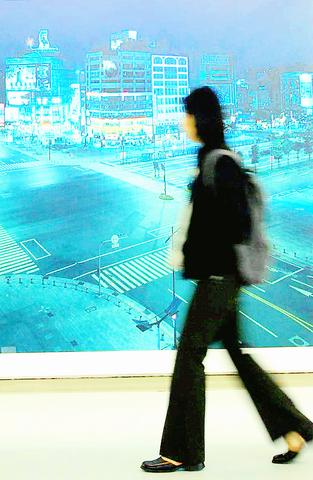If the Taipei Biennial ever had a political goal, it was the amicable diplomacy of art.
But this year the brand of cross-strait bickering usually reserved for government officials has intruded on an exhibition that since 1998 has put the Taipei Fine Arts Museum on contemporary art's international map.
The 2002 Taipei Biennial, curated by Bartomeu Mari of Spain and Taiwan's Jason Wang (

PHOTO: SEAN CHAO, TAIPEI TIMES
The opening, held last night, attracted critics and curators from Lyons to Beijing, who had all come to see an exhibition conscientiously designed around artifice, spectacle and the spaces in which people live and act. Its theme is "Great Theater of the World."
The behind-the-scenes intrigue comes from the dark world of politics.
The drama began in March at Brazil's Sao Paulo Biennial, where the Chinese government put pressure on organizers to remove the word "Taiwan" from Taiwan's national pavilion, making it the only one of around 70 national pavilions not designated by a country. The pavilion's entrance merely read "Taipei Fine Arts Museum."
In response, Taiwan's representative artist, Chang Chien-chi (
Chang, a photographer devoted to social issues that are more or less borderless, is not part of this year's biennial, but Wang Gong-hsin (
Word of Wang's presence broke yesterday in a Chinese-language newspaper, which raised the question of his involvement in the Sao Paulo incident.
Museum officials, Wang and the art world in general, denounced the allegation as ridiculous.
Wang, in fact, called the article "amusing," but refused to enter into any debate, saying that as an artist it was more suitable to remain in the province of art.
Taiwanese sources also defended Wang.
The co-curator of the 2000 Taipei Biennial, Manray Hsu (許文瑞), who was also in Sao Paulo, said of the censorship incident, "It had more to do with the [Chinese] government. They were the source of the pressure."
Museum director Huang Tsai-lang (
Even the beleaguered Chang said, "There's no proof of Wang's involvement."
Though the buzz of controversy was still building at last night's opening ceremony, but visiting artists were not impressed.
"The reason we have these exhibitions is to move away from these stupid boundaries and limitations," said Edwin Zwakman, an artist from the Netherlands.
"This is not a propaganda game for governments," he said.
For more information on the art work in the 2002 Biennial, see tomorrow's features page.

HORROR STORIES: One victim recounted not realizing they had been stabbed and seeing people bleeding, while another recalled breaking down in tears after fleeing A man on Friday died after he tried to fight the knife-wielding suspect who went on a stabbing spree near two of Taipei’s busiest metro stations, Taipei Mayor Chiang Wan-an (蔣萬安) said. The 57-year-old man, identified by his family name, Yu (余), encountered the suspect at Exit M7 of Taipei Main Station and immediately tried to stop him, but was fatally wounded and later died, Chiang said, calling the incident “heartbreaking.” Yu’s family would receive at least NT$5 million (US$158,584) in compensation through the Taipei Rapid Transit Corp’s (TRTC) insurance coverage, he said after convening an emergency security response meeting yesterday morning. National

Beijing could eventually see a full amphibious invasion of Taiwan as the only "prudent" way to bring about unification, the US Department of Defense said in a newly released annual report to Congress. The Pentagon's "Annual Report to Congress: Military and Security Developments Involving the People's Republic of China 2025," was in many ways similar to last year’s report but reorganized the analysis of the options China has to take over Taiwan. Generally, according to the report, Chinese leaders view the People's Liberation Army's (PLA) capabilities for a Taiwan campaign as improving, but they remain uncertain about its readiness to successfully seize

Taiwan has overtaken South Korea this year in per capita income for the first time in 23 years, IMF data showed. Per capita income is a nation’s GDP divided by the total population, used to compare average wealth levels across countries. Taiwan also beat Japan this year on per capita income, after surpassing it for the first time last year, US magazine Newsweek reported yesterday. Across Asia, Taiwan ranked fourth for per capita income at US$37,827 this year due to sustained economic growth, the report said. In the top three spots were Singapore, Macau and Hong Kong, it said. South

PLANNED: The suspect visited the crime scene before the killings, seeking information on how to access the roof, and had extensively researched a 2014 stabbing incident The suspect in a stabbing attack that killed three people and injured 11 in Taipei on Friday had planned the assault and set fires at other locations earlier in the day, law enforcement officials said yesterday. National Police Agency (NPA) Director-General Chang Jung-hsin (張榮興) said the suspect, a 27-year-old man named Chang Wen (張文), began the attacks at 3:40pm, first setting off smoke bombs on a road, damaging cars and motorbikes. Earlier, Chang Wen set fire to a rental room where he was staying on Gongyuan Road in Zhongzheng District (中正), Chang Jung-hsin said. The suspect later threw smoke grenades near two exits